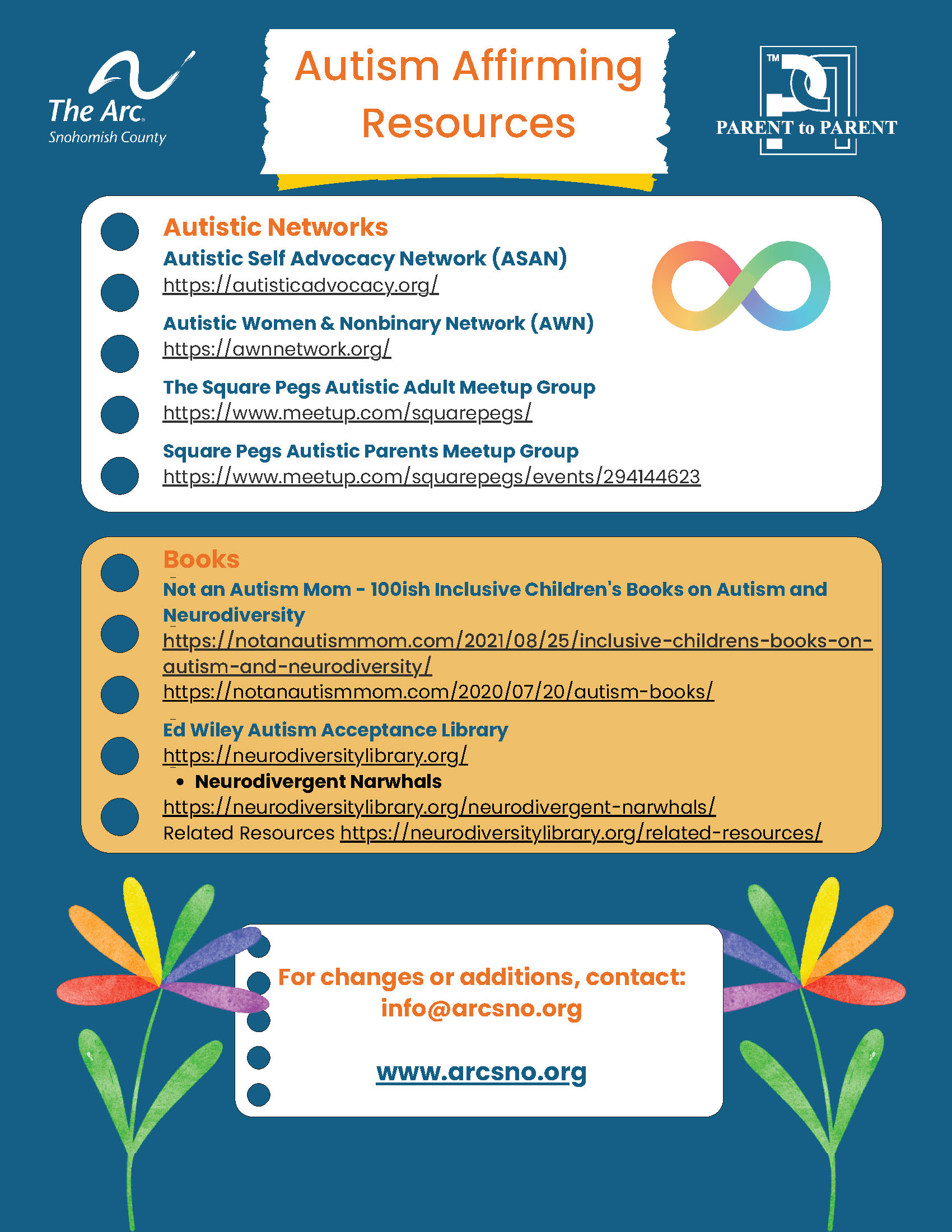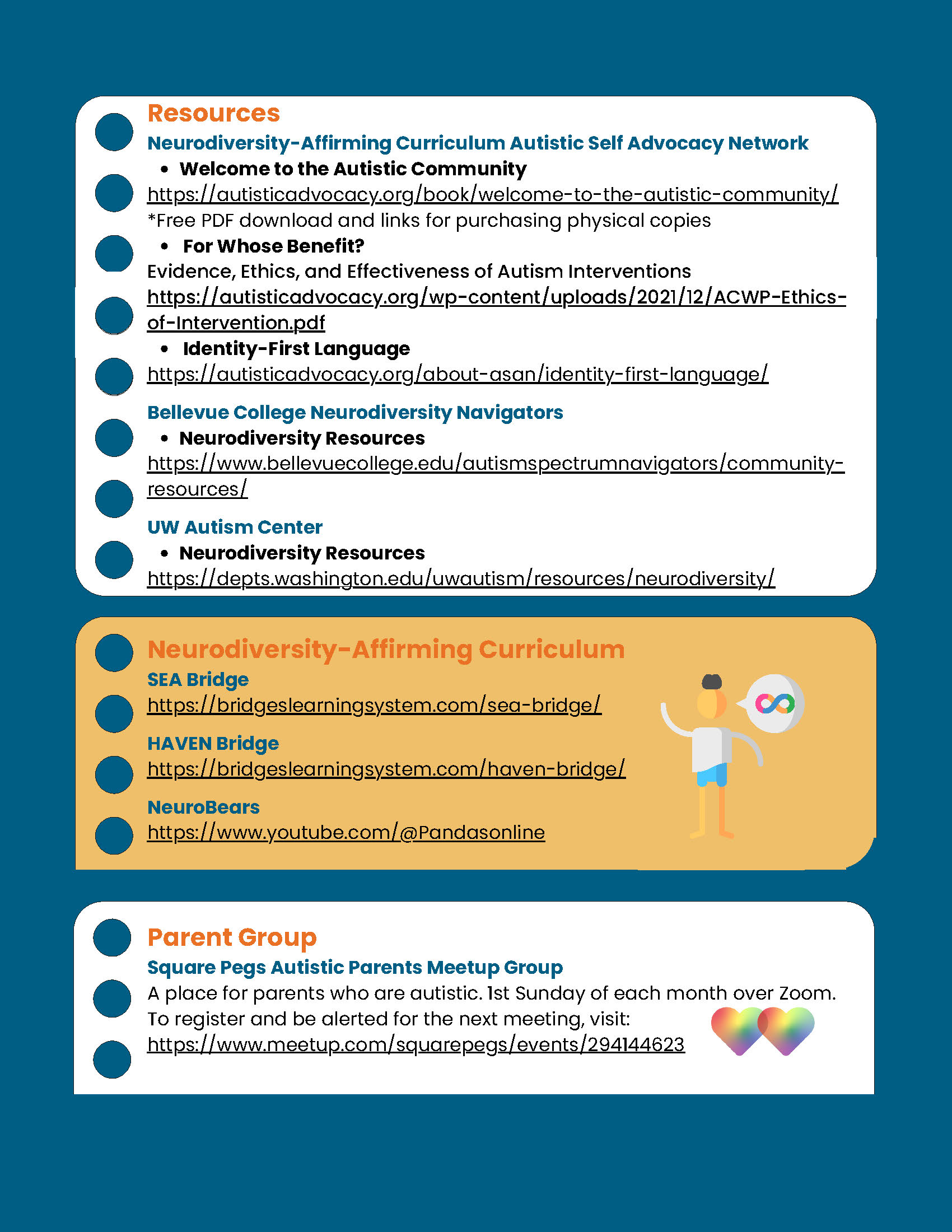A source for sharing stories of inclusion and belonging, bold activism and local change-makers in action.
The mission of this platform is to amplify diverse voices and “good news” stories from within the disability community in Snohomish County and across the region.
*The Arc Amplified is an online publication of The Arc of Snohomish County. Learn more about our mission and values at arcsno.org/about
Do you have a story of inclusion you want to share?
Are you leading local advocacy efforts? Has your family or loved one benefited from activities or programs in Snohomish County that are designed to advance community inclusion?
We want to know!
Send an email to:
Courtney Criss
Leadership & Advocacy Program Manager
Courtney@arcsno.org
or call (425) 258-2459 x 106.
The Return of The Arc’s Legislative Forum
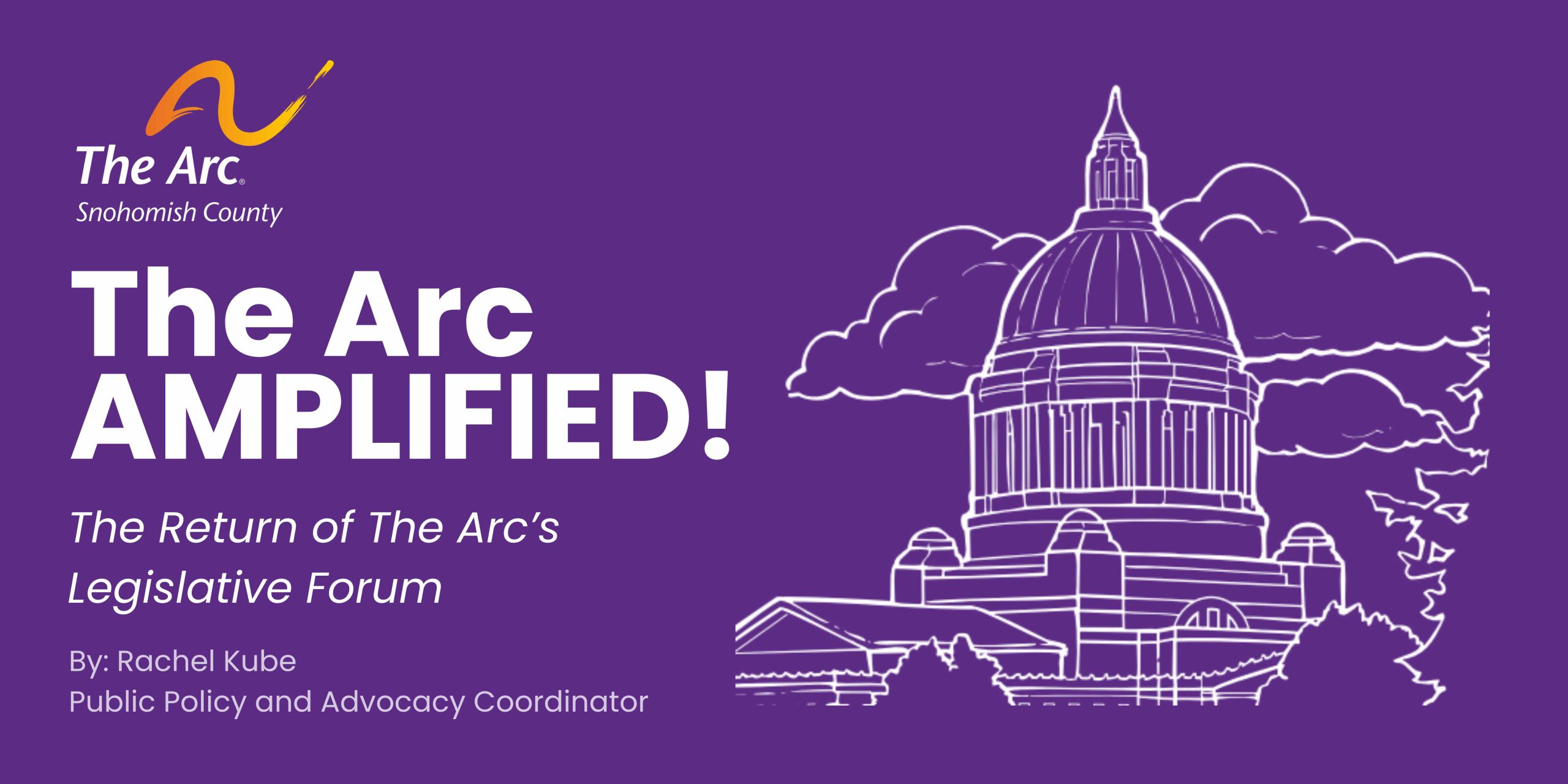
The Return of The Arc’s Legislative Forum
On September 18th, The Arc of Snohomish County hosted its first large in-person Legislative Forum since 2018. Legislative Forums are disability advocacy events held during election years for state legislators and legislative candidates to connect with and hear directly from the Snohomish County intellectual and developmental disability (IDD) community. Legislative Forums feature speakers who share their professional and lived experiences about policy topics impacting the IDD community. Following speaker presentations, all attending legislators and legislative candidates have the opportunity to share their remarks. In the 2020 and 2022 election years, The Arc of Snohomish County held Legislative Forums virtually over Zoom and individually by legislative district.
The return to an all-district in-person Legislative Forum this year was significant for a few reasons. As in previous years prior to 2020, the 2024 Legislative Forum was held in the Weyerhaeuser Room, the formal banquet hall at the Everett Station. Returning to the large venue, The Arc invited the attendance of all legislators, legislative candidates, and community members from each of the 8 legislative districts within Snohomish County. The Arc was honored to be joined by 14 Washington State legislators and legislative candidates, and dozens of community members. In a departure from previous years, the 2024 Legislative Forum expressly included time at the end for post-event networking. Legislators, candidates, and community members stayed after the event to connect organically, take pictures, and share disability advocacy stories.
The Arc is very grateful to the 8 speakers who shared their professional and lived experiences about policy topics affecting the IDD community in Snohomish County and beyond. The highlighted advocacy topics were care providers, mental health supports, and affordable housing for people with IDD. The group of 2024 Legislative Forum speakers was composed of self-advocates with IDD, parents and caregivers of children with IDD, and professionals in the topic fields.
The 2024 Legislative Forum slideshow, policy priorities, and follow up flyers and resources are available in the Legislative Forum online resource folder. This event was livestreamed and recorded on Zoom for accessibility.
For more photos of the event, check out The Arc of Snohomish County’s official Instagram account: @arcsnohomishleads.
All local Washington State representative positions and some senator positions are up for election on Tuesday, November 5, 2024. Register to vote or check your voter registration status at VoteWA.org.VoteWA.org.
Thank you to the speakers, legislators, legislative candidates, and community members who made the 2024 Legislative Forum a resounding success!
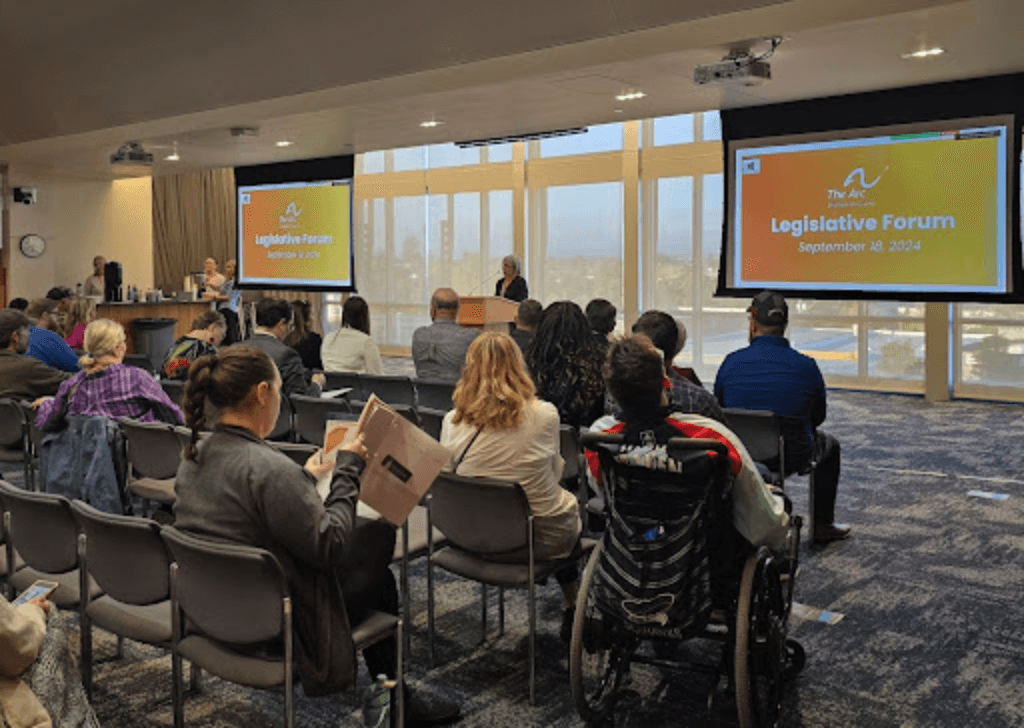
The Arc of Snohomish County’s Executive Director stands at a podium and delivers her opening speech at the Legislative Forum.
Autism Acceptance Month 2024
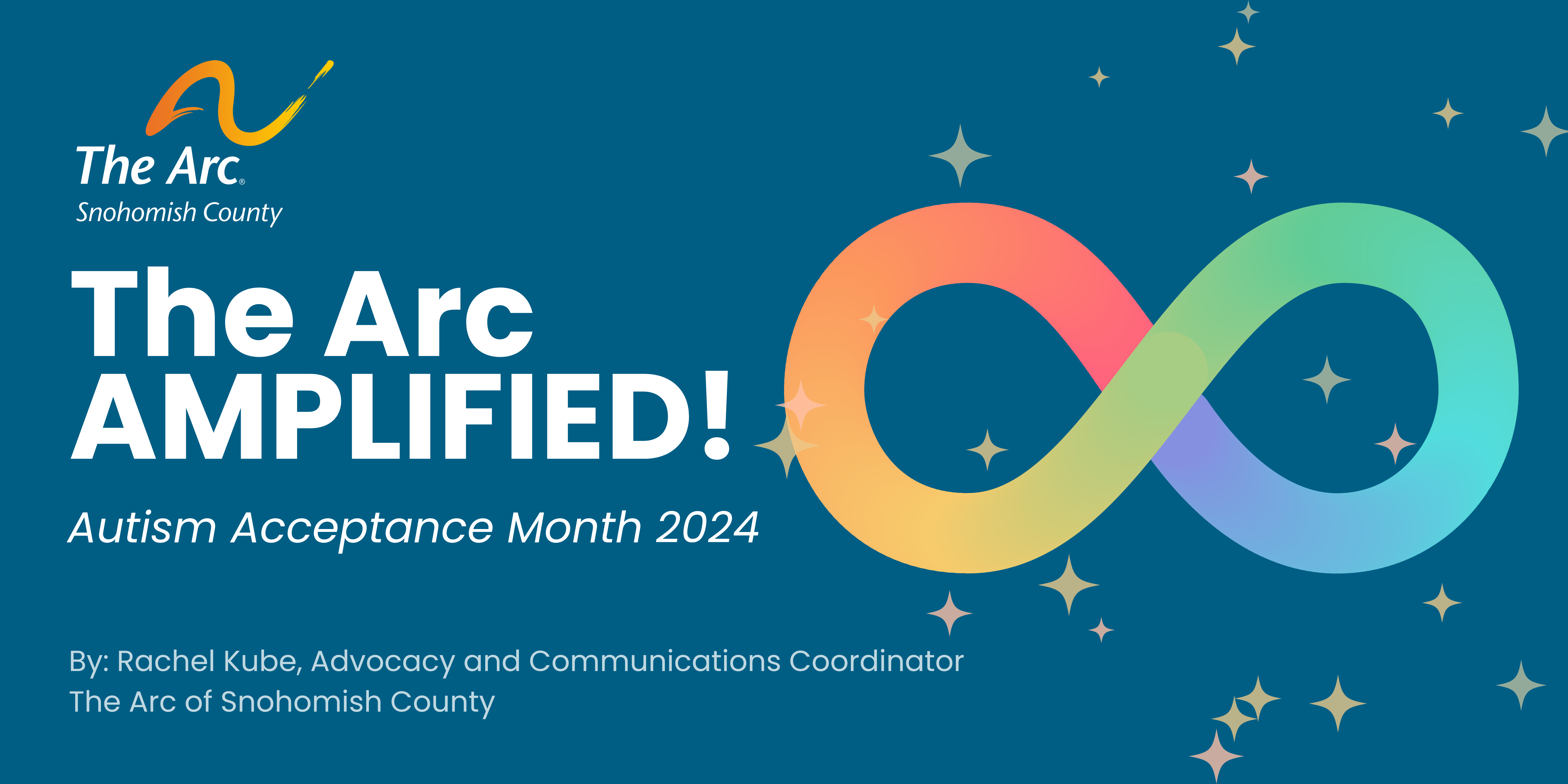
Autism Acceptance Month 2024
April is Autism Acceptance Month. In celebration of this month, The Arc of Snohomish County dedicates this Arc Amplified post to our autistic friends, family, and community members. We see and appreciate you.
It’s Autism Acceptance, Not Autism Awareness
There is an important distinction between the words “awareness” and “acceptance.” Where awareness shows observation, acceptance demonstrates the meaningful step from passive recognition to active inclusion. When we say Autism Acceptance Month instead of Autism Awareness Month, we call attention to this distinction.
Autism Acceptance Month is about celebrating autistic neurodiversity, valuing the strengths and contributions of autistic people, and prioritizing accessibility and inclusion.
Autism 101
Autism, also known as Autism Spectrum Disorder (ASD), is a developmental disability that an individual is born with. Though autism is often diagnosed in childhood, it can be diagnosed across the lifespan. Not every autistic person will seek out official testing and diagnosis; this does not negate autistic identity. Neurodiversity and neurodivergence are umbrella terms that encompass autism, Attention Deficit Hyperactivity Disorder (ADHD), and other neurodevelopmental disabilities.
Autism impacts the way an individual experiences, processes, and navigates the world around them. Current ASD diagnostic criteria looks at differences in social-emotional reciprocity, social communication, sensory processing, and repetitive patterns of behavior. Autism exists on a spectrum; individual traits, qualities, talents, and support needs differ from one autistic person to another. There is infinite diversity to the autistic experience.
No, Autism Does Not Need a “Cure”
“Disability is a natural part of the human experience and in no way diminishes the right of individuals to participate in or contribute to society.”
– Individuals with Disabilities Education Act (IDEA), Section 1400 (c) (1)
Like other naturally occurring developmental disabilities, autism is lifelong and neither has nor needs a “cure.” Autistic people will always be autistic. Conversations about autism sometimes include rhetoric about finding a “cure.” Whether seeking to train away the outward display of autistic traits or develop a “cure,” approaching autism as a problem to be solved has harmful repercussions.
Instead, shift focus to the supports, resources, and accessibility tools that empower autistic people to thrive in the lives of their choosing.
Allyship in Action This Autism Acceptance Month and Beyond
- Believe autistic people when they tell you about their experiences and autistic identity
- Value the perspectives, autonomy, rights, and dignity of autistic people
- Recognize that autistic people are the experts on their own lives and access needs
- Use respectful language about autism. Many autistic people use Identity First Language (“autistic person” instead of “person with autism”)
- Support autistic creators: read books, articles, and blog posts by autistic writers; watch films and videos by autistic actors, comedians, and content creators
- Listen to and learn from autistic people
- Talk about autism acceptance in your community
- Challenge harmful societal beliefs about autism and autistic people
- Prioritize accessibility: make places, spaces, and communication accessible, sensory-friendly, and responsive to support needs
- In the spirit of the disability rights slogan “nothing about us without us,” center and include autistic people in conversations about autism, accessibility, and supports
- Celebrate and show your love for the autistic people in your life!
Autism Affirming Resources
For more information about autism acceptance networks, books, resources, curriculum and more, check out The Arc of Snohomish County’s Autism Affirming Resources
2024 Legislative Session Recap
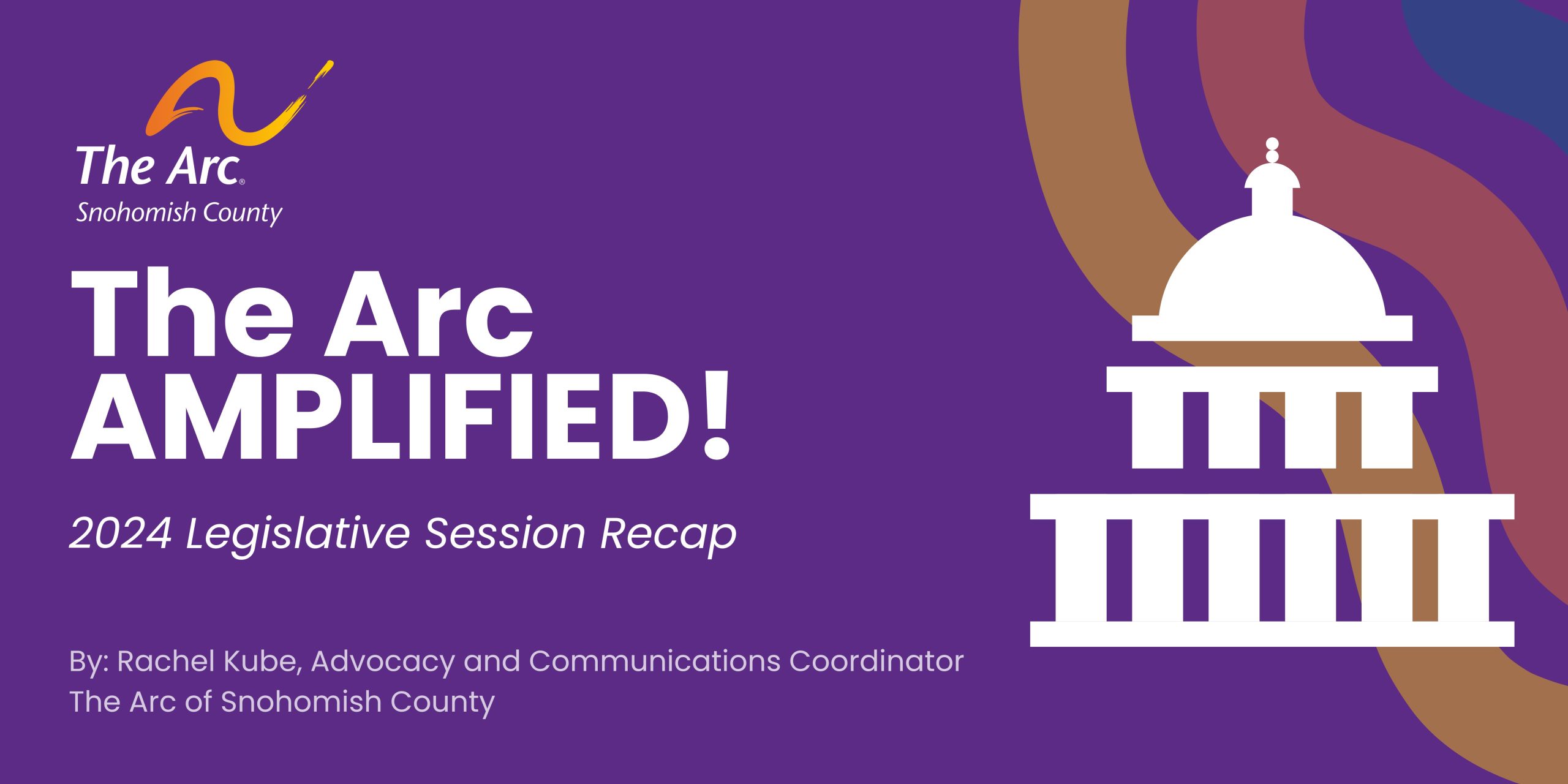
2024 Legislative Session Recap
Each Washington State legislative session brings new policy changes impacting our state’s intellectual and developmental disability (IDD) community. From January to March 2024, there was a short 60 day legislative session where many bills officially supported by The Arc of Washington State passed into law.
The Arc of Snohomish County created the annual Legislative Recap resource to dive into the new laws that passed and how they impact the IDD community. This resource also includes bills that did not pass this year, taking a look at continued advocacy focal points moving forward into future legislative sessions. The 20 minute 2024 Legislative Recap video presentation is now available on The Arc of Snohomish County’s Vimeo. Tune in to the recorded presentation or view the slides for highlights from the legislative session, updates on passed bills including the Nothing About Us Without Us Act, and information on how to get involved and make a difference in Washington State policy. Thank you for all of your advocacy!
How to Get Involved
- Legislative Forum Planning Committee
- The Arc of Snohomish County is preparing for the fall 2024 Legislative Forum disability advocacy event with legislators and legislative candidates. You are invited to share your input and ideas for the 2024 Legislative Forum by attending the Legislative Forum Planning Committee meeting on Monday, April 15 from 7-8:30 PM. Please register here or fill out the Legislative Forum Planning Committee interest survey.
- 2024 IDD Community Survey
- The Arc of Snohomish County wants to hear from you about the important topics affecting our Snohomish County intellectual and developmental disability (IDD) community. Responses from this anonymous survey will help guide The Arc of Snohomish County’s 2024 programming and legislative advocacy!
- Online Leadership Training
- Become an Arc Trained Leader with our self-paced online curriculum all about building your strengths as a leader and advocate in the intellectual and developmental disability community. Please register here.
Resources
2024 Legislative Recap (Video) (Slideshow PDF)
Legislative Forum Planning Committee (Registration) (Google Form)
Online Leadership Training (Registration)
2024 IDD Community Survey (Google Form)Disability Activism Book Club and Watch Club!
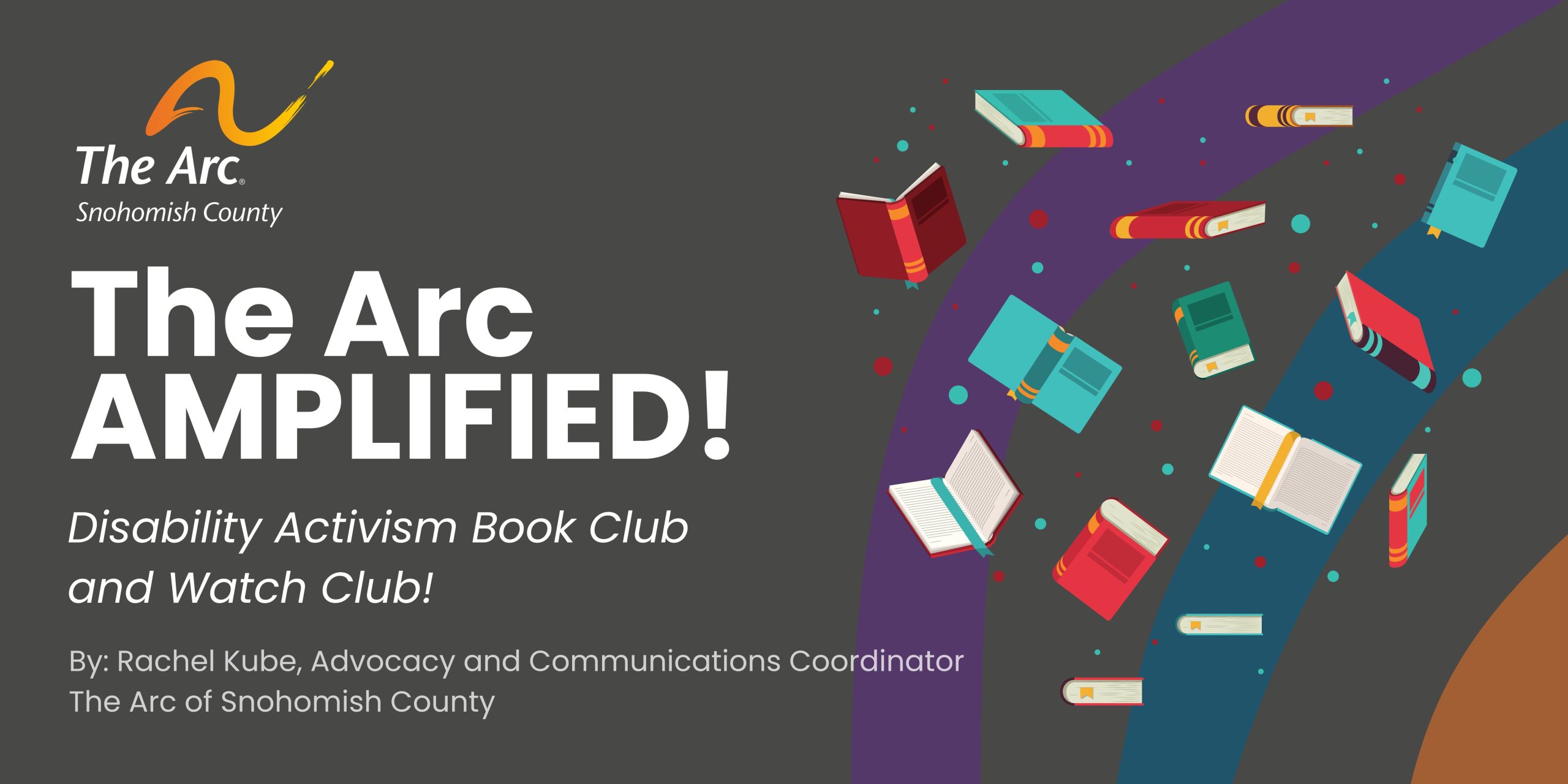
Disability Activism Book Club and Watch Club!
In the spirit of Women’s History Month and Developmental Disabilities Awareness Month, The Arc of Snohomish County is celebrating the contributions of disability rights advocates who have shaped history. The following books, films, and Ted Talks are by and about activists who reframe social views on disability, amplify the diversity of the disability experience, and bring forth calls for disability acceptance, advocacy, and action!
Activist: Judith Heumann
Official website: https://judithheumann.com/
Book recommendation: Being Heumann: An Unrepentant Memoir of a Disability Rights Activist
Goodreads summary: One of the most influential disability rights activists in US history tells her personal story of fighting for the right to receive an education, have a job, and just be human.
A story of fighting to belong in a world that wasn’t built for all of us and of one woman’s activism—from the streets of Brooklyn and San Francisco to inside the halls of Washington—Being Heumann recounts Judy Heumann’s lifelong battle to achieve respect, acceptance, and inclusion in society.
Children’s book recommendation: Fighting for YES!: The Story of Disability Rights Activist Judith Heumann
Film recommendation: Crip Camp: A Disability Revolution
Ted Talk recommendation: “Our Fight for Disability Rights – And Why We’re Not Done Yet”
Activists: Janet Taggart, Evelyn Chapman, Katie Dolan, Cecile Lindquist
Film recommendation: “Together They Were Stronger”
Summary: This short documentary celebrates the untold story of four women who mounted an all-out civil rights campaign to create a movement establishing the first-ever disability rights law in the United States, WA HB 90.
Activist: Leah Lakshmi Piepzna-Samarasinha
Official website: https://brownstargirl.org/
Book recommendation: Care Work: Dreaming Disability Justice.
Goodreads summary: In this collection of essays, Lambda Literary Award-winning writer and longtime activist and performance artist Leah Lakshmi Piepzna-Samarasinha explores the politics and realities of disability justice, a movement that centers the lives and leadership of sick and disabled queer, trans, Black, and brown people, with knowledge and gifts for all.
Care Work is a mapping of access as radical love, a celebration of the work that sick and disabled queer/people of color are doing to find each other and to build power and community, and a tool kit for everyone who wants to build radically resilient, sustainable communities of liberation where no one is left behind. Powerful and passionate, Care Work is a crucial and necessary call to arms.
Activist: Alice Wong
Official website: https://disabilityvisibilityproject.com/
Book recommendation: Year of the Tiger: An Activist’s Life
Goodreads summary: From the founder and director of the Disability Visibility Project, and the editor of the acclaimed anthology Disability Visibility, a genre-bending memoir in essays offers a glimpse into an activist’s journey to finding and cultivating community and the continued fight for disability rights.
Drawing on a collection of original essays, previously published work, conversations, graphics, photos, commissioned art by disabled and Asian American artists, and more, Alice uses her unique voice and talent to share a raw and multifaceted impressionistic collage of her life as an Asian American disability rights activist, community builder, and media maker. From her love of good food and pop culture to her unwavering commitment to speaking out against the often complex and overlooked ways inequities and injustices play out in an ableist society, Alice tells her story and creates a space to hear from other disability activists through enriching conversations. From a world-class activist and storyteller, Alice’s Year of the Tiger offers humor and wisdom, and encourages us to do better.
Activist: Stella Young
Official website: https://stellayoung.com.au/
Ted Talk recommendation: “I’m Not Your Inspiration, Thank You Very Much”
Activist: Haben Girma
Official website: https://habengirma.com/
Book recommendation: Haben: The Deafblind Woman Who Conquered Harvard Law
Goodreads summary: Born with deaf-blindness, Girma grew up with enough vision to know when someone was in front of her and enough hearing to know when someone close to her was talking. However, she had difficulty reading facial features or distinguishing people in group conversations. Relying on her own problem-solving skills, Girma overcame roadblocks while simultaneously obtaining her undergraduate and then law degree.
Further reading:
7 Women Who Shaped the Disability Rights Movement
Zip Shuttle Coming
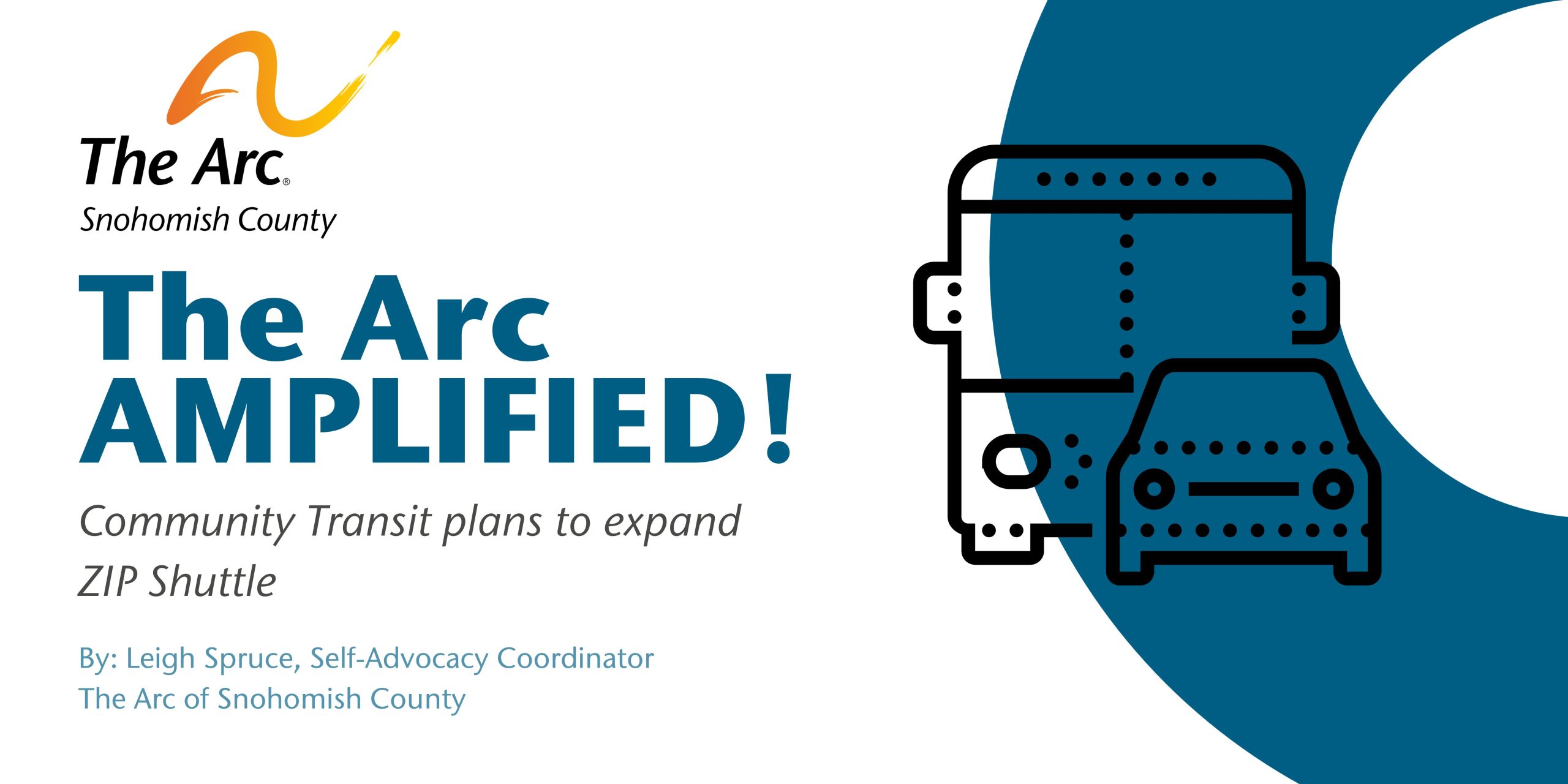
Community Transit plans to expand ZIP Shuttle
Community Transit has been identifying areas in Snohomish County where people who don’t drive are needing access to public transit to get around their communities. Lynnwood developed a micro transit system in collaboration with Community Transit and community non- profit partners so that people have an easier way to get around. This pilot program called Zip is currently in the stage where it is being studied. The feedback from people who use it has been positive.
Community Transit is now in the early planning stages of expanding this service to other cities (Arlington, Lake Stevens, and Darrington) who are isolated from larger communities. These areas are looking to have more of a shuttle-type service, rather than a bus system, since these areas are smaller. I learned that Darrington had no public transportation access for almost 30 years. They recently partnered with Homage Senior Services Transportation Assistance Program (TAP) to help both Senior Citizens and Persons with Disabilities by providing transportation access to areas where there are needed services (i.e. from a rural area where there is no public transportation access to a bigger city). Lake Stevens service area seems only to be concentrated around the lake itself and those who live further out of the area who have little to no access to different areas around the city itself.
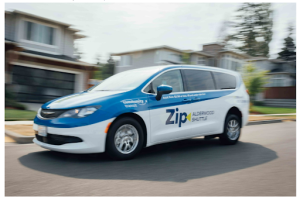 Developing a system like Zip Shuttle in smaller areas might better benefit from a fixed bus route. It is the same cost as a regular bus, but you have more payment options available, like Orca/Debit/credit card/cash. Children ride for free until age 19. The service also has child and baby car seats available for use. As well as bike racks. It works on an on-demand and shared ride basis like Uber/Lyft through a phone app. They plan to have the service in these areas running within the next 2 years.
Developing a system like Zip Shuttle in smaller areas might better benefit from a fixed bus route. It is the same cost as a regular bus, but you have more payment options available, like Orca/Debit/credit card/cash. Children ride for free until age 19. The service also has child and baby car seats available for use. As well as bike racks. It works on an on-demand and shared ride basis like Uber/Lyft through a phone app. They plan to have the service in these areas running within the next 2 years.
Those interested in learning more about this service can find information on Community Transits webpage https://www.CommunityTransit.org/Zip Shuttle.
By: Leigh Spruce, Self-Advocacy Coordinator, Leigh@arcsno.org
Leadership Through Art

Leadership Through Art – Painting Orcas
What does painting Orca whales have anything to do with Leadership?
Orca whales are powerful, regal creatures.
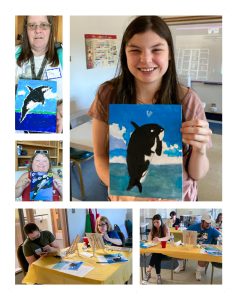
They can tip over a boat or lead fishermen to better waters.
Self-advocates met in early August for a painting class where they all painted an Orca whale leaping out of the water.
Art teacher Jessie Tear found the Orca picture to give inspiration to the artists and taught some painting techniques.
All the participants used their unique talents and perspectives to create their own interpretations.
 |
The paintings were then submitted to the Evergreen State Fair where they received a purple banner, blue ribbons and a perfect score.
|
August US Congressional Recess
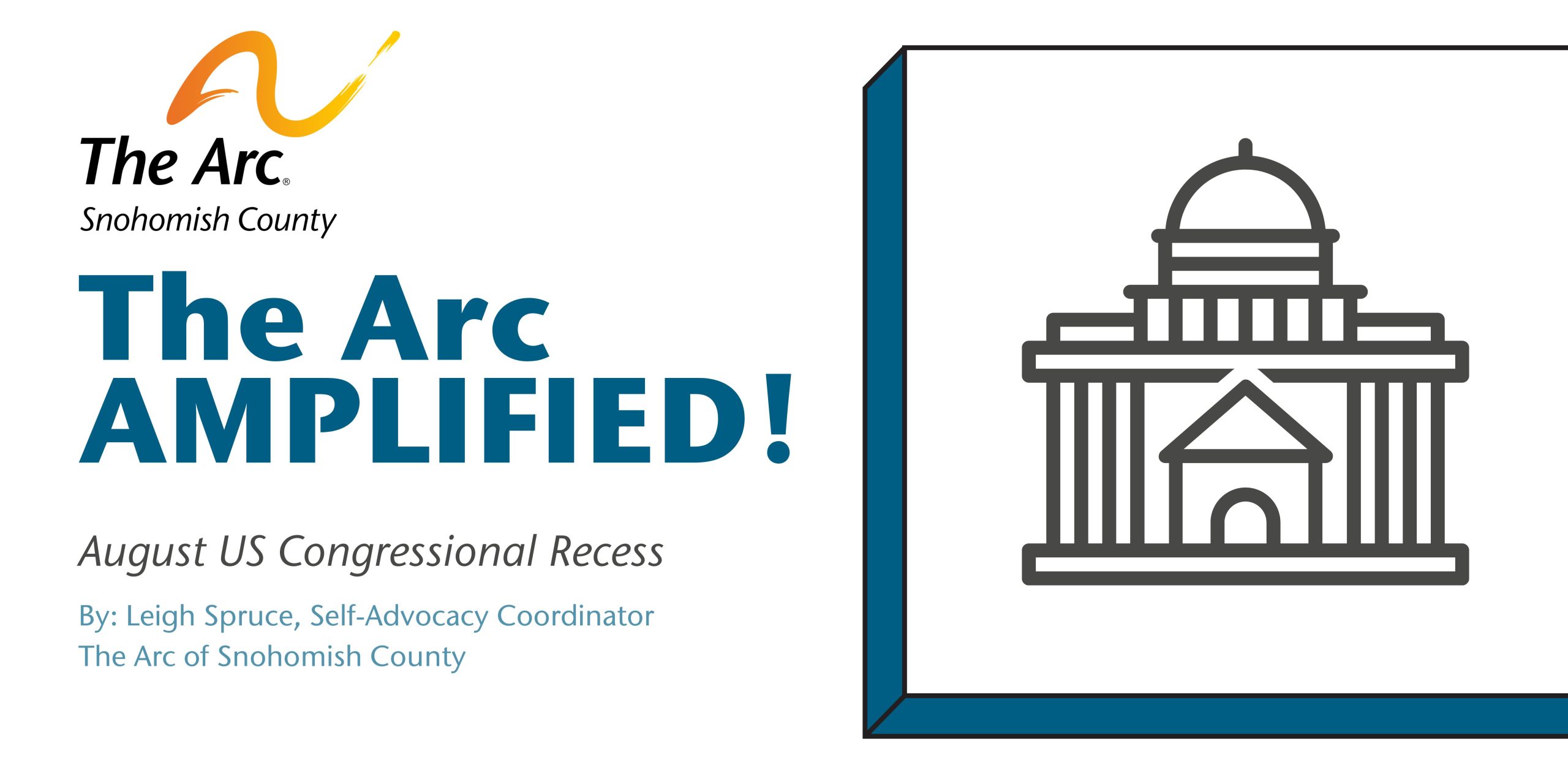
August US Congressional Recess
The United States Congress will be going into recess from July 31 through Labor Day Weekend this year. Two key issues that are going to be considered are Social Security (“SSI”) Income Limits and Marriage Penalty Act. Neither of these issues have been updated since 1989. SSI has established resource limits in order to receive benefits. The Arc of the United States is asking for an increase in these limits from $2000/month per individual on SSDI and $3000/month for couples to $10,000/individual and $20,000 for couples. With times changing, and cost of living having increased considerably, this change is very necessary. The issue with writing and passing these bills is the cost of writing the bills. 
 These bills currently don’t have bill numbers; however, we need to raise awareness on why this is needed. In order for this to get this on the floor in Congress, it needs bipartisan support. We as advocates really need to get in touch with your Representatives and Senators to help them to understand why these Bills are necessary.
These bills currently don’t have bill numbers; however, we need to raise awareness on why this is needed. In order for this to get this on the floor in Congress, it needs bipartisan support. We as advocates really need to get in touch with your Representatives and Senators to help them to understand why these Bills are necessary.
Don’t get discouraged if you can’t speak to your Representatives and Senators directly. You can get involved by contacting their personnel, as well as by attending a Town Hall meeting that would be scheduled in their area. Share your stories. Sign up on their websites and get email alerts. You can also contact Aides to host an action day. They can help you with what to say to your legislators. Share this information with others. There is an advocacy toolkit on The Arc of US website where you can find out more. ‘Lookout Days’ are posted every Wednesday throughout August to get alerts. You also follow on Facebook, Instagram and Twitter. Get involved with your local chapter of The Arc. Contact Jake at The Arc of Snohomish County for legislative updates: jake@arcsno.org.
The Arc of the U.S. will be hosting Advocacy Days in August. During this period, you can sign up to get email alerts in these important issues at https://thearc.org
View the August US Congressional Resess Recording from The Arc US
~~~
Leigh Spruce is the Self-Advocacy Coordinator for The Arc of Snohomish County. She can be reached at leigh@arcsno.org or 425-258-2459 ext 103.
Do words matter?
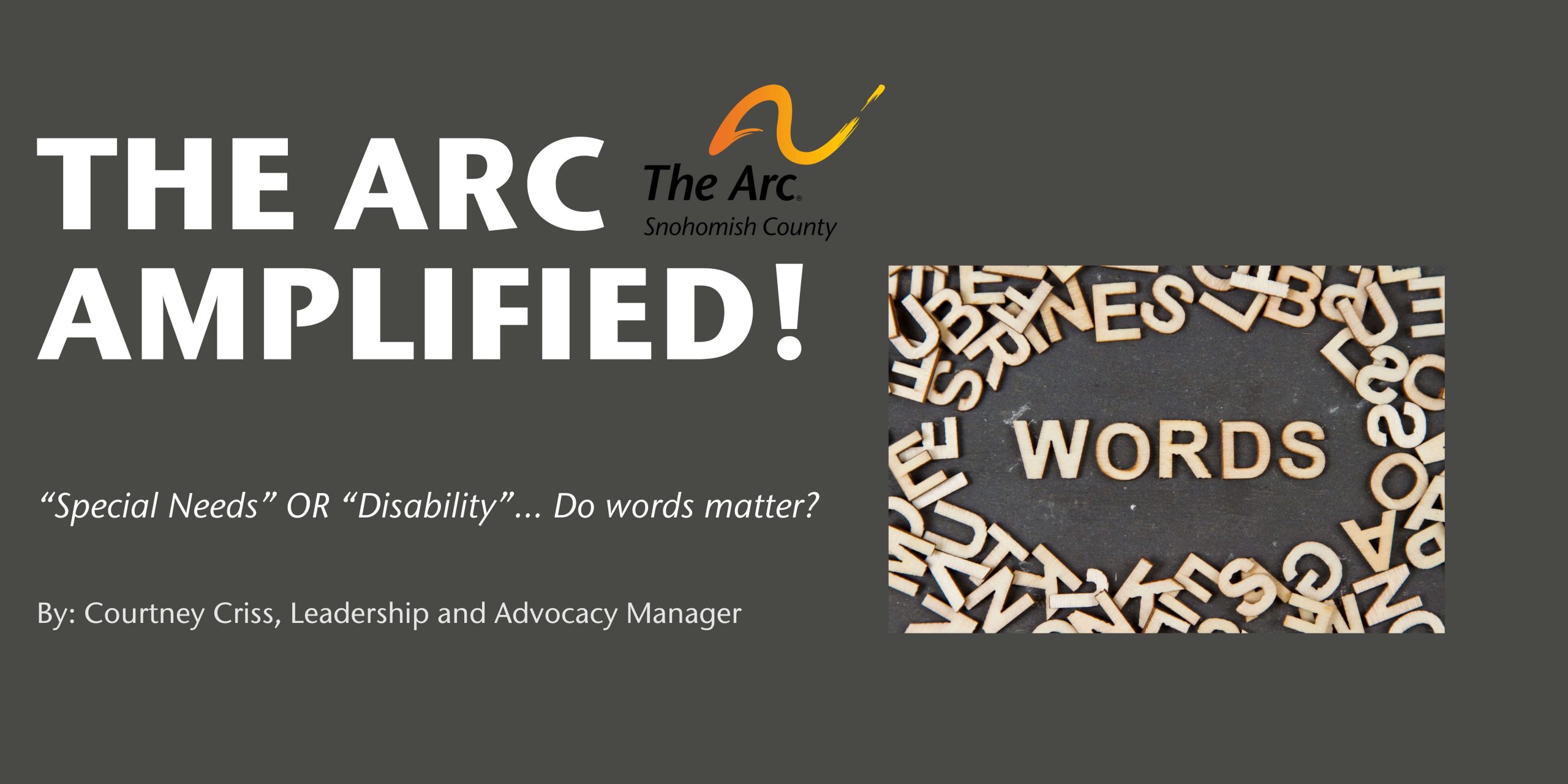
“Special Needs” OR “Disability”… Do words matter?
Facebook can be time-waster but occasionally someone initiates a thoughtful discussion. In one of the groups to which I belong (several groups for parents with kids with Down syndrome), a mom posted a question of whether we should use the term special needs or disability. Other moms commented with their thoughts and resources and it got me thinking why someone might choose an alternative to the word disability.
Perhaps because the word disability has been associated with negativity. The definition of disability is a physical or mental condition that limits a person’s movements, senses, or activities. It makes people think that a disabled person can’t do something. So an alternate description to mean the person requires specialized services or assistance was created: special needs. However, it’s more of a euphemism which is meant to downplay something negative.
Lately, more and more people with disabilities are advocating for the term disability to be used and the term special needs to be eradicated from our vocabulary. Lawrence Carter-Long, Public Affairs Manager of the National Council on Disability created the #SayTheWord campaign to encourage people to say disabled and acknowledge the power of disability culture and identity. In an article for USA Today in June 2021, Lisette Torres-Gerald, board secretary for the National Coalition for Latinxs with Disabilities, states “My needs are not ‘special;’ they are the same, human needs that everyone else has, and I should be able to fully participate in society just as much as the next person.” Several actors with Down syndrome participated in a World Down Syndrome Day video in 2017 explaining that they don’t have special needs; they have human needs like everyone else. I highly recommend taking 5 minutes out of your day to watch this video!
It should be noted that the term disability is the one used in federal and state laws. The ADA stands for the Americans with Disabilities Act and IDEA stands for the Individuals with Disabilities Education Act. Using the word disability provides an individual with protections under the law while special needs does not. Additionally, accommodations should allow those with and those without disabilities to access a venue or participate in an event.
In an article on the online blog “The Mighty” another good point was mentioned about mocking or bullying. The term special or special needs can be used to mock and bully people with disabilities. Rarely is the term disability used to mock.
 Why do some of us parents not like the word disability? When my son with Down syndrome was born 10 years ago, I was feeling sad, scared, overwhelmed, out of control, isolated, worried…the list goes on. For months I could not say the words Down syndrome without tearing up. To me, the words Down syndrome were extremely negative. I worried that he would not be accepted, included, loved. I worried that he would have the worst schooling, the worst job, the worst life ahead of him.
Why do some of us parents not like the word disability? When my son with Down syndrome was born 10 years ago, I was feeling sad, scared, overwhelmed, out of control, isolated, worried…the list goes on. For months I could not say the words Down syndrome without tearing up. To me, the words Down syndrome were extremely negative. I worried that he would not be accepted, included, loved. I worried that he would have the worst schooling, the worst job, the worst life ahead of him.
Once I got him started with the birth-to-three (Early Support for Infants and Toddlers or ESIT) program and I saw him working hard at meeting milestones, I felt more comfortable. When I met other families who had kids with Ds, I felt more confident. When I started volunteering for the Down Syndrome Center of Puget Sound (f/k/a the Down Syndrome Community), I saw what was possible. And when my fourth child was diagnosed prenatally with Down syndrome, I was happy and not the least bit sorry.
As parents we all have our journeys learning about, accepting and even celebrating our children’s diagnosis. I wonder if that changes our word choices too.
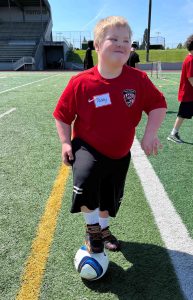
**Courtney Criss is the Leadership and Advocacy Manager at The Arc of Snohomish County. She is also a wife and mother of four children, two of which have Down syndrome. She was born and raised in the Seattle area and dreams of an inclusive society for all. Opinions expressed in this article are her own and are not attributed to The Arc of Snohomish County.
Special Education Policy Changes
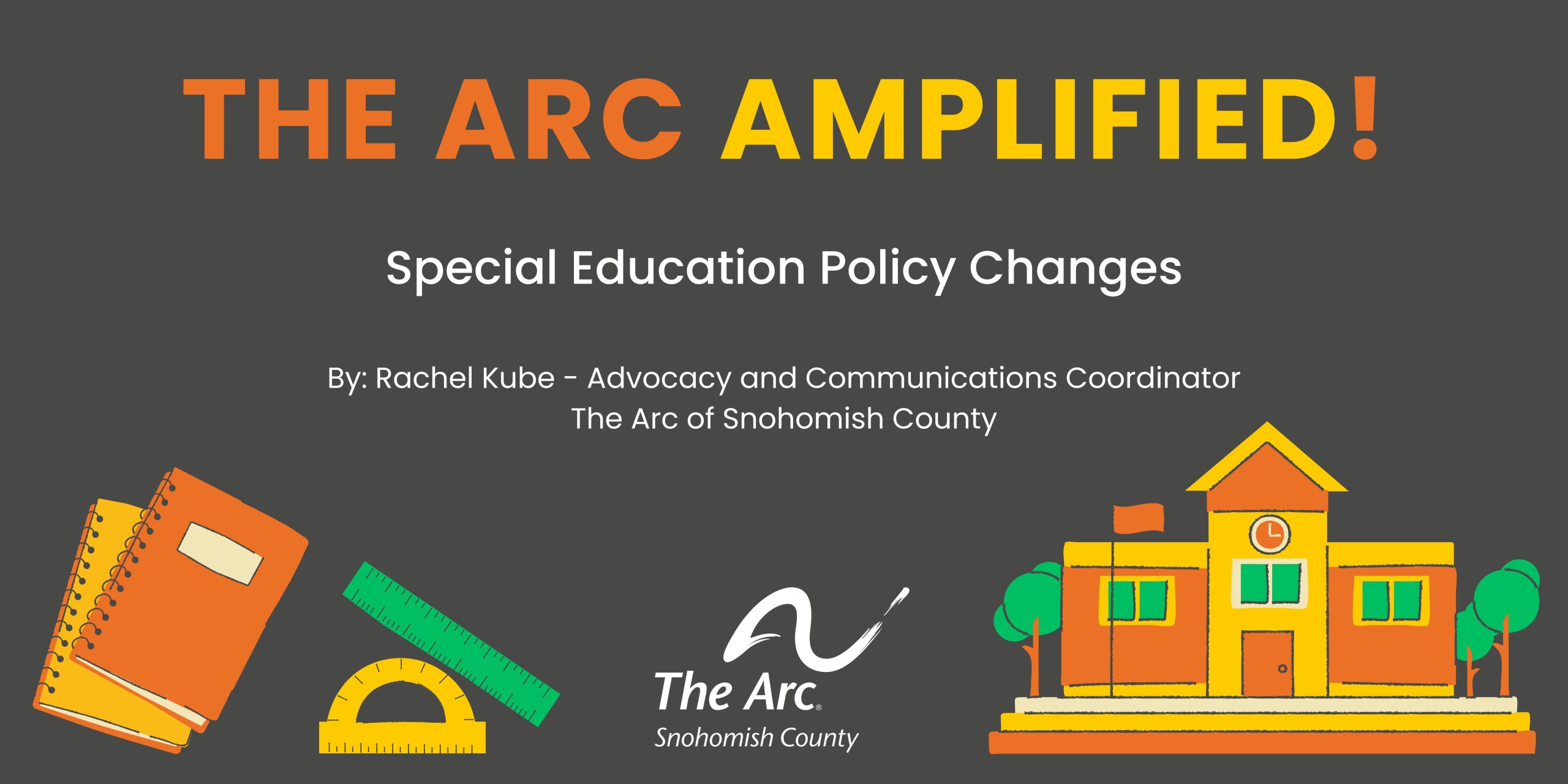
At a Glance
We’ll say it – special education is a big deal! From curriculum modifications to assistive technology to occupational and physical therapy, special education supports and services help students with disabilities thrive. Between the ages of 3 and 21, individuals with intellectual and developmental disabilities have a federally recognized right to a free and appropriate public education. In accordance with this legal commitment, Individualized Education Programs (IEPs) establish student education goals and guide the provision of special education services.The 2023 Washington State legislative session heard many different bills seeking to make changes to state level special education law and policy. This edition of Arc Amplified will take a closer look at special education bills that passed and “died,” and what you need to know about the policy changes to come.
Special Education Funding Cap
In the current 2022-2023 school year, Washington State has a special education funding cap set at 13.5%. This means that funding for special education services is capped at 13.5% of a school district’s total student population. School districts must use other funding sources, such as local levies and safety net funding, to pay for special education services when more than 13.5% of the student population have IEPs. For example, if 18.5% of the students in a school district receive special education services, state special education funding will cap at 13.5% and the district will have to use other funding for the remaining 5% of the student population.
A Tale of Two Bills
This year, two different special education bills (HB 1436 and SB 5311) sought to make changes to the same special education funding formula. Throughout the legislative session, legislators in the House and the Senate made significant amendments to both HB 1436 and SB 5311. As the changes unfolded, so too did changes in which bill The Arc of Washington State favored over the other. The original HB 1436 would incrementally increase the special education funding cap until removing it entirely in the 2027-2028 school year, and SB 5311 would increase the special education funding cap from 13.5% to 15%. As of Friday, April 21st, the House and Senate reached a compromise with these two bills. They put the new striking amendment on HB 1436, which is now the bill moving forward. The special education funding cap is raised to 15% starting in the 2023-2024 school year. This bill also requires reviews and technical assistance for disproportionality, and adds special education ombuds, run by the Office of the Education Ombuds, to each educational service district (ESD). Additionally, it requires a specific accounting methodology through 2026-27, lowers the threshold for accessing safety net for high-cost IEPs, and provides professional development for inclusionary practices. The Senate passed this new bill unanimously and the House has signed, and now the final step is for the Governor to sign it into law!
What Passed Both Chambers?
Of this year’s education related bills, many made significant progress towards becoming Washington State law. Here are the bills that have passed both the House and the Senate:
- HB 1207 will create new resources and policies for addressing harassment, intimidation, bullying, and discrimination in schools. The Arc of Washington State supports this bill.
- HB 1238 will provide one free breakfast and one free lunch to students who request a meal in grades K-4 in school districts that meet certain federal poverty guidelines. The Arc of Washington State supports this bill.
- HB 1550 will establish a transition to kindergarten program for eligible children. The Arc of Washington State lists HB 1550 as under review, meaning that The Arc of Washington State has not taken a firm stance on this bill.
- SB 5243 will establish new requirements and advanced planning for high school and beyond plans for students both with and without IEPs. The Arc of Washington State supports this bill.
- SB 5315 will create standards for approval, monitoring, and investigating Non-Public Agencies serving students with disabilities. The Arc of Washington State supports this bill.
What Didn’t Pass?
Other education bills from earlier in session will not pass this year. As this year is the first year in the 2023-2024 biennium, it is possible for this year’s “dead” bills to carry over into next year’s legislative session to try again.
- HB 1109 died when it did not pass out of Senate Ways and Means. This bill would incentivize school districts to conduct IEP meetings during the summer. This would allow students with IEPs to start the school year with their IEP goals, curriculum modifications, and special education services in place. The Arc of Washington State supported this bill.
- HB 1248 died in House Rules. This bill would expand student transportation funding to include various other incidental transportation costs, such as out of district transportation. Currently, Washington State school transportation funding only covers standard home to school transportation routes. All extra services are not funded by the state and instead are covered by the district. The Arc of Washington State supported this bill.
- HB 1305 died in House Rules. This bill would improve access to the federally mandated free and appropriate public education for students with disabilities. Among the many changes to access to special education services, this bill also originally would have changed the burden of proof for denial of services from the parent to the district. This would have opened up many more special education opportunities for students who need them, and made it more difficult for districts to deny those services. This provision was removed from a later version of the bill, and this caused it to lose support from most of the IDD community. The Arc of Washington State supported the original bill.
- HB 1479 died when it did not make it out of the Senate Committee on Early Learning and K-12 Education. This bill would completely remove student isolation from schools, and greatly limit restraint to be used only in the instance of safety for the student or others. The Arc of Washington State supported this bill.
- SB 5031 died when the Senate refused to concur with the House amendments. This bill would have allowed out-of-state Non-Public Agencies to apply for Washington State special education safety net funding. The Arc of Washington State listed this bill as under review.
- SB 5174 died when the House insisted on its amendments after the Senate refused to concur. This bill would have required OSPI to cover school transportations costs and would also make changes to the transportation funding formula. The Arc of Washington State listed this bill as under review.
Want to Learn More?
The Washington State 2023 legislative session adjourned sine die on Sunday, April 23rd. Join The Arc of Snohomish County on Thursday, May 18th from 6-7 PM for our Legislative Recap event! Jake and Rachel will share the highlights from the legislative session and the important new policy changes affecting Washington State’s intellectual and developmental disability community. Join us on Zoom to learn more about the bills that passed and “died,” answer your questions about the legislative session, and discuss next steps for continued advocacy. Register to receive the Legislative Recap Zoom link.
Transition Club Empowers the Next Generation of Self-Advocate Leaders
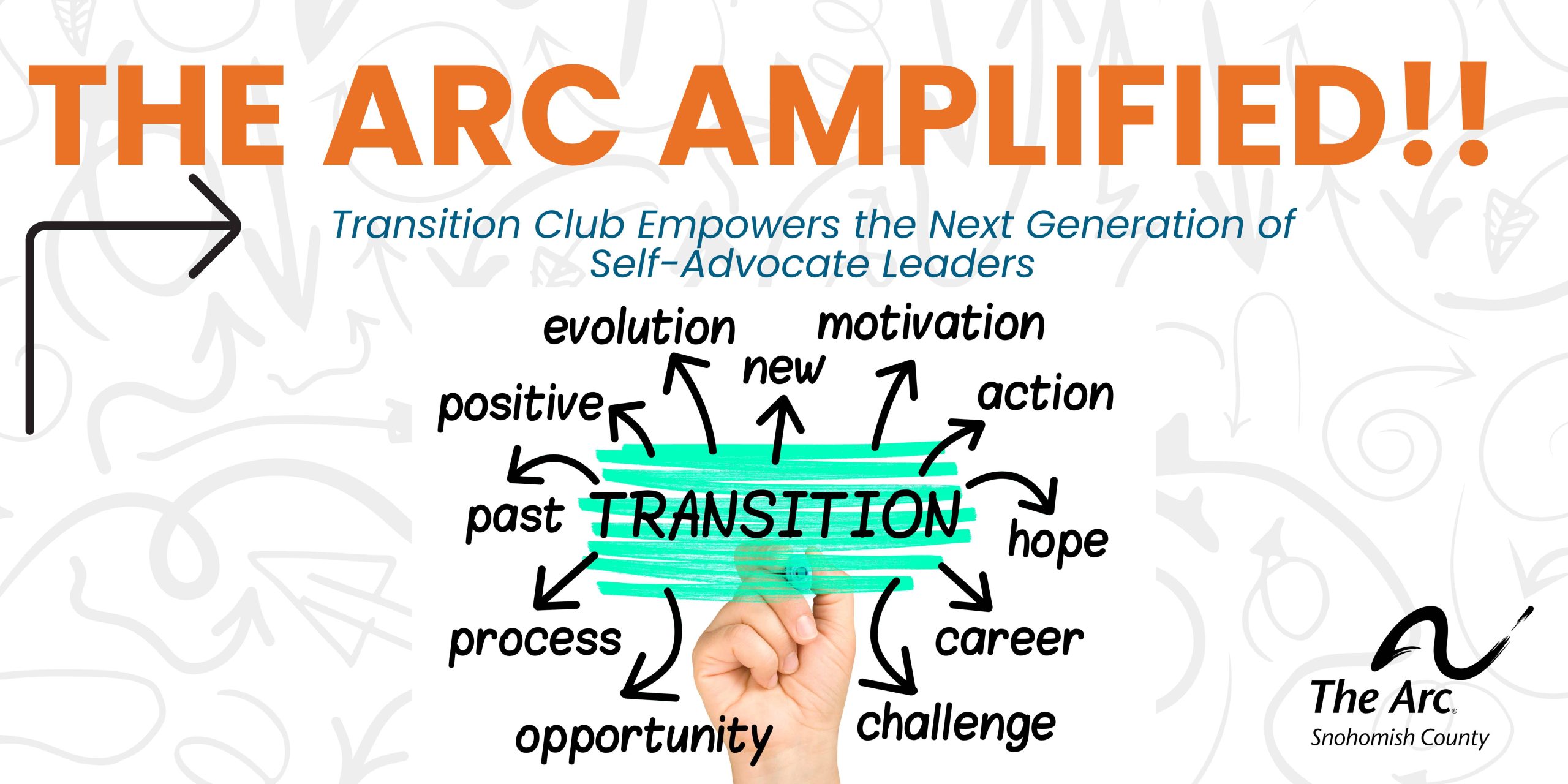
Transition Club Empowers the Next Generation of Self-Advocate Leaders
Why does our community need self-advocate leaders?
There are many local committees, boards, and planning groups create programs, activities, projects, and make a difference in our community. This includes anything from Friends of the Library, to parks committees, to PTAs, to groups advising local and state policy makers. It is important that the voices of those with Intellectual and Developmental Disabilities (IDD) are represented.
What are Transition Clubs?
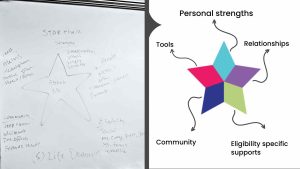
Who participates?
Students enrolled in Transition services in 10 districts in Snohomish County participate in Transition Clubs. Some districts have Transition Club’s located at High Schools working with students ages 14-18.
Who leads?
Jessie Moore, Leadership Development Coordinator for The Arc of Snohomish County, has been growing this Transition Clubs (that started with one program in 2009) for the last 7 years. She creates the games and activities, and plans the discussion topics. Jessie or another Arc staff member facilitates each Transition Club. When possible, a self-advocate (trained Arc leader) co-facilitates the Transition Club sharing their lived experience to mentor students. The Arc has 10 Transition Club leaders/Co-facilitators, 5 of them are previous Transition Club students.
What goes on there?
What are the outcomes?
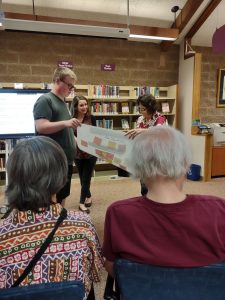
Pictured Left: Dylan Pezoldt (Transition Club Leader) sharing input at the Arlington Public Library Community input meeting
Examples of leadership and personal growth for self-advocate leaders:
———————————————————————————————————————
For more information about Transition Club contact:
Jessie Moore, Leadership Development Coordinator Jessie@arcsno.org / 425-258-2459 x109


